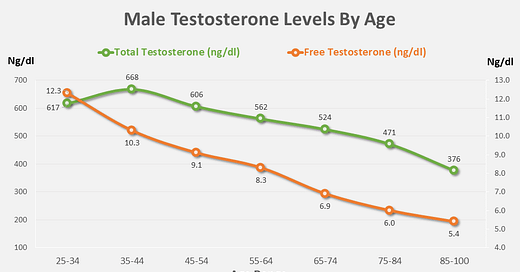Hi and happy Thursday!
I just had my free and total testosterone levels checked. Here are my results:
Total Testosterone: 241 ng/dL
Free Testosterone: 6.1 ng/dL
This is not the first time I have checked my testosterone. I have done this twice in the past:
2014 total testosterone: 672 ng/dL (23.3 nmol/L)
2021 total testosterone: 380 ng/dL
2021 free testosterone: 13.6 ng/dL
My first observation is that my levels have declined substantially over the last 10 years. It is normal that testosterone falls by about 1% per year after age 30 or so. But my declines are much more severe.
My second observation is that my current levels are shockingly low.
What should my levels ideally be? Here is a graph of average male testosterone measured by A. Vermeulen back in 1995:
I have used this chart from 30 years ago because testosterone has fallen dramatically in men over the last 30-50 years, and it’s probably not a bad idea to compare with ‘healthier’ old levels.
Compared to an average male my age at this time, I should be above 600 for total, and above 9 for free. But instead I am at 241 and 6.1.
Not good.
The only good news is that my free testosterone is not as low as my total. And it’s this testosterone that is key, because:
Total testosterone measures the overall amount of testosterone in the bloodstream. However, the majority of it (about 98%) is bound to proteins like sex hormone-binding globulin (SHBG) and albumin. Bound testosterone is not readily available for use by the body's tissues.
Only a small fraction (about 2%) is free testosterone, which is not bound to proteins and is able to enter cells and exert its biological effects.
Free testosterone can bind to androgen receptors in tissues such as muscles, bones, and the brain. This means it's responsible for driving many of the effects testosterone has on the body, including muscle mass, energy levels, libido, mood regulation, and cognitive function.
But my free testosterone is still on par with that of a 75-year old male 30 years ago.
Why is my testosterone so low?
I have one theory: fasting. I have been on a substantial caloric restriction over the last few months, and this is normally associated with low testosterone.
Btw, Bryan Johnsen (one of the pioneers in longevity experimentation) is on a permanent 10% caloric restriction, and to the best of my understanding, he uses testosterone replacement therapy (TRT) to compensate for the effects of caloric restriction.
Also, free testosterone tends to be better preserved than total during caloric restriction, so this is another data point suggesting that caloric restriction is the culprit.
What will I do to increase my testosterone?
For the next 30 days, I will try to be in caloric balance, and I will also increase my protein intake. Then I will take a new test. Let’s see what happens.
What’s next?
In a week, I will give you a summary of some of the key news stories in the longevity space.
For any new readers: I am trying to live to (at least) 151. To get there, I follow 2 main principles:
Live a super-healthy life (based on what science deems positive for longevity)
Measure what’s going on in my body, and tune any metrics that are off to become optimal
And I share everything worth sharing with you.
If you enjoyed this newsletter, I would be very grateful if you give it a ‘like’ (the ❤️ at the top).
Have a good day,
Johan






I just looked at back at my saved labs and I guess it’s never been tested. When I get to India in the next few months, I’ll get this done (non-insurance, cash based labs so a la carte and they come to home to collect sample!). Thanks for making me consider this!